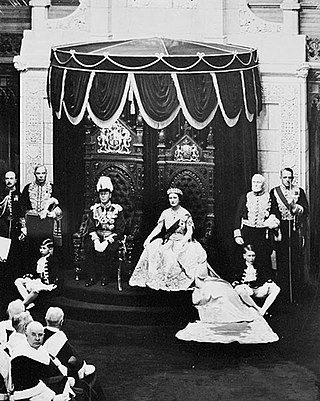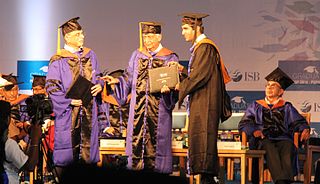
The Parliament of the United Kingdom of Great Britain and Northern Ireland is the supreme legislative body of the United Kingdom, and may also legislate for the Crown Dependencies and the British Overseas Territories. It meets at the Palace of Westminster in London. Parliament possesses legislative supremacy and thereby holds ultimate power over all other political bodies in the United Kingdom and the Overseas Territories. While Parliament is bicameral, it has three parts: the sovereign (King-in-Parliament), the House of Lords, and the House of Commons. In theory, power is officially vested in the King-in-Parliament. However, the Crown normally acts on the advice of the prime minister, and the powers of the House of Lords are limited to only delaying legislation; thus power is de facto vested in the House of Commons.

The Parliament of Canada is the federal legislature of Canada, seated at Parliament Hill in Ottawa, and is composed of three parts: the King, the Senate, and the House of Commons. By constitutional convention, the House of Commons is dominant, with the Senate rarely opposing its will. The Senate reviews legislation from a less partisan standpoint and may initiate certain bills. The monarch or his representative, normally the governor general, provides royal assent to make bills into law.

Royal assent is the method by which a monarch formally approves an act of the legislature, either directly or through an official acting on the monarch's behalf. In some jurisdictions, royal assent is equivalent to promulgation, while in others that is a separate step. Under a modern constitutional monarchy, royal assent is considered little more than a formality. Even in nations such as the United Kingdom, Norway, the Netherlands, Liechtenstein and Monaco which still, in theory, permit their monarch to withhold assent to laws, the monarch almost never does so, except in a dire political emergency or on advice of government. While the power to veto by withholding royal assent was once exercised often by European monarchs, such an occurrence has been very rare since the eighteenth century.

The Scotland Act 1998(c. 46) is an Act of the Parliament of the United Kingdom which legislated for the establishment of the devolved Scottish Parliament with tax varying powers and the Scottish Government. It was one of the most significant constitutional pieces of legislation to be passed by the UK Parliament between the passing of the European Communities Act in 1972 and the European Union (Withdrawal) Act in 2018 and is the most significant piece of legislation to affect Scotland since the Acts of Union in 1707 which ratified the Treaty of Union and led to the disbandment of the Parliament of Scotland.

A consistory court is a type of ecclesiastical court, especially within the Church of England where they were originally established pursuant to a charter of King William the Conqueror, and still exist today, although since about the middle of the 19th century consistory courts have lost much of their subject-matter jurisdiction. Each diocese in the Church of England has a consistory court.

A convocation is a group of people formally assembled for a special purpose, mostly ecclesiastical or academic.
An enabling act is a piece of legislation by which a legislative body grants an entity which depends on it for the delegation of the legislative body's power to take certain actions. For example, enabling acts often establish government agencies to carry out specific government policies in a modern nation. The effects of enabling acts from different times and places vary widely.

The Parliament of Victoria is the bicameral legislature of the Australian state of Victoria that follows a Westminster-derived parliamentary system. It consists of the King, represented by the Governor of Victoria, the Legislative Assembly and the Legislative Council. It has a fused executive drawn from members of both chambers. The parliament meets at Parliament House in the state capital Melbourne. The current Parliament was elected on 26 November 2022, sworn in on 20 December 2022 and is the 60th parliament in Victoria.
A parochial church council (PCC) is the executive committee of a Church of England parish and consists of clergy and churchwardens of the parish, together with representatives of the laity. It has its origins in the vestry committee, which looked after both religious and secular matters in a parish. It is a corporate charitable body.

The Prevention of Terrorism Act 2005 was an Act of the Parliament of the United Kingdom, intended to deal with the Law Lords' ruling of 16 December 2004 that the detention without trial of eight foreigners at HM Prison Belmarsh under Part 4 of the Anti-terrorism, Crime and Security Act 2001 was unlawful, being incompatible with European human rights laws.
The General Synod is the tricameral deliberative and legislative organ of the Church of England. The synod was instituted in 1970, replacing the Church Assembly, and is the culmination of a process of rediscovering self-government for the Church of England that had started in the 1850s.

The Government of Wales Act 2006 is an Act of the Parliament of the United Kingdom that reformed the then-National Assembly for Wales and allows further powers to be granted to it more easily. The Act creates a system of government with a separate executive drawn from and accountable to the legislature. It is part of a series of laws legislating Welsh devolution.
This is a brief description of the lawmaking procedure in India.

The Convocations of Canterbury and York are the synodical assemblies of the bishops and clergy of each of the two provinces which comprise the Church of England. Their origins go back to the ecclesiastical reorganisation carried out under Archbishop Theodore of Canterbury (668–90) and the establishment of a separate northern province in 733. Until 1225 the synods were composed entirely of bishops, but during the thirteenth century more and more clergy were cited until by 1283 the membership was established as the bishops, deans, archdeacons and abbots of each province together with one proctor (representative) from each cathedral chapter and two proctors elected by the clergy of each diocese. The main purpose of the convocations was to take counsel for the well-being of the church and to approve canonical legislation, but in practice much time was spent in discussing the amount of tax to be paid to the Crown since the clergy were a separate estate of the realm and refused to be taxed in or through Parliament. Before the end of the nineteenth century, the Convocation of Canterbury, which was numerically very much larger, played the major role and the activity of the Convocation of York was often little more than giving formal approval to the decisions taken by the southern province.
The Ecclesiastical Committee is a statutory joint committee of the Parliament of the United Kingdom, created by the Church of England Assembly (Powers) Act 1919 to review Church of England measures submitted to Parliament by the Legislative Committee of the General Synod.

An act of Parliament in the United Kingdom is primary legislation passed by the UK Parliament in Westminster, London.

The Marriage (Wales) Act 2010 c.6 is an Act of Parliament in the United Kingdom. Introduced as a private member's bill by David Rowe-Beddoe, Baron Rowe-Beddoe and sponsored by Alun Michael MP, it received royal assent on 18 March 2010. It created the Church in Wales's counterpart to mirror the Church of England Marriage Measure 2008 No. 1 and brought the Church in Wales's marriage regulations into line with those of the Church of England.

An Act of Senedd Cymru, or informally an Act of the Senedd, is primary legislation that can be made by the Senedd under part 4 of the Government of Wales Act 2006. Prior to 6 May 2020 any legislation was formally known as an Act of the National Assembly for Wales or informally, an Act of the Assembly.
Parliamentary sovereignty, also called parliamentary supremacy or legislative supremacy, is a concept in the constitutional law of some parliamentary democracies. It holds that the legislative body has absolute sovereignty and is supreme over all other government institutions, including executive or judicial bodies. It also holds that the legislative body may change or repeal any previous legislation and so it is not bound by written law or by precedent.










